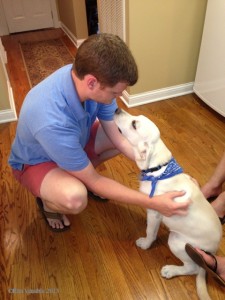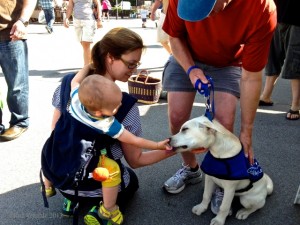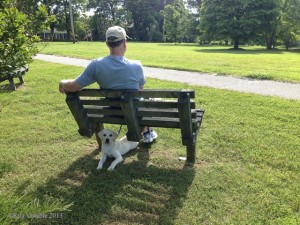Many people bemoan the fact that babies do not come with instruction manuals. Puppies from Southeastern Guide Dogs actually do come with manuals.

Raising Argo, our first potential guide dog, has been a growth experience for my husband and me. In many ways, Argo is a typical dog. He likes to run, sleep, and play. He gets bored. He likes air-conditioning a lot. He tries to chew socks, shoes, area rugs, luggage straps, and my favorite, metal chair rungs on bar stools.
In other ways, Argo is unlike any other dog we have had before. Guide dogs have been bred for many years specifically for the purpose of leading the blind. He gets under benches when we sit down. We didn’t teach him this; he just does it. He has never had food from the table and doesn’t expect it. He hardly ever barks and is not defensive. He rides quietly in the car on the floorboard. He likes everybody including delivery and HVAC repair people, children in restaurants, and our neighbors. He likes other dogs. He does not, however, like to fetch or swim.
We have had to think outside of the “seeing” box in order to train him.
Basic commands used with pets are not that useful to a guide dog. Heel does not mean to follow. It means to stand at the side of the person. (Who wants a guide dog that follows?) When you tell him to “Come!” he gently bumps your hand when he arrives. This is to let you know he is there.

Other people that know or have Labrador retrievers have preconceived training notions just as we did. We cannot let Argo jump on people even if their dogs do! A sight-impaired person would not see an 80-lb. dog coming and might capitulate. Plus, the dog could knock down children or old people in church or in the grocery store—not a good trait for a guide dog! One well-meaning person tried to teach Argo to roll over. How would he do this with a harness on? Somebody mentioned teaching Argo to fold his paws and “pray.” We actually considered this when Argo got hold of my bible one day and tore out several pages from Chronicles.
Once, when I was in a conversation, I looked down to find Argo happily chewing on my shoelaces that he had untied. Can you imagine how un-useful this would be to a sight-impaired person?

Many aspects of raising a service dog puppy are special, but lots of aspects are still the same. They need food and medical care, of course, plus affection, play, discipline, exercise, and socializing with people and other dogs. Most of all, they need love. I find myself telling myself not to get too attached, that he is leaving next year, but then I place that realization into a box of other thoughts labeled “Think About Later.”
So my husband and I do love him. If we thought about missing him in the future, we would miss the joy of the present. For now, Argo is here and it is the present. Who among us has more than this?
